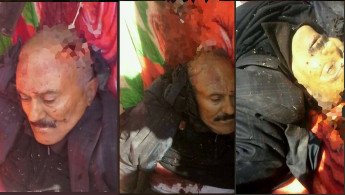Fight or flight? Saleh loyalists slam 'fake' killing video
One of the theories on the unprecedented death of Saleh, which has been widely shared by top officials and members of his General People’s Congress party, suggests the former statesman was killed while battling Houthi rebels in his Sanaa home, not while fleeing the capital as is believed.
“He never left his house. What took place was a disgusting fabricated attempt to make Ali Abdullah Saleh look like he was fleeing – and this did not happen. There is evidence to show he was not killed today but in fact he was killed yesterday. Saleh did not retreat,” Brigadier Yahia Abu Hatem, adviser to the Yemeni Minister of Defence told Egyptian ON Live TV.
A video which quickly gained traction online on Monday showed the corpse of Saleh – which clearly showed gunshot wounds to the head – being carried in a blanket after rebels ambushed his fleeing convoy. But since then, officials and supporters of the former president have questioned the authenticity of the events due to the lack of blood on the blanket.
“The video they broadcast to show his lifeless corpse had no blood whatsoever this is evidence that he was not killed in that moment but at another time and location,” Abu Hatem said, suggesting Saleh was killed hours earlier.
Twitter Post
|
“Furthermore pictures that were taken of his ID were inside the home, not outdoors,” he added, referring to circulating images taken by the rebels to prove they killed Saleh.
Saleh on Saturday announced the end of his alliance with the Houthi rebels, with whom he has jointly ruled the capital for three years.
The 75-year-old strongman announced he was open to talks with Saudi Arabia and its allies on condition they ended their crippling blockade on Yemen's ports and airports – dealing a serious blow to his already fragile alliance with the Iran-backed Houthis.
The move prompted a fierce battle to erupt in the capital Sanaa which left more than 200 dead before ending in a fierce gun fight between Houthi rebels and Saleh at his home, the official claimed.
“Despite any differences we may have with Saleh, we know he was not a coward, he was a fighter and a military man.
“They tried to show Saleh’s loyalists that he was in the process of betraying them by fleeing and leaving them to fight.”
On Tuesday, US Defence Secretary Jim Mattis said the killing of Saleh would short term, likely worsen an already dire humanitarian situation in the country.
The Houthis, who have now disassociated from forces loyal to the former slain president, are fighting government forces backed by a Saudi-led Arab military coalition.
More than 10,000 people – over half of them civilians – have been killed since the coalition intervened in 2015.
The fighting has caused a humanitarian catastrophe which the UN says is the world's worst, pushing seven million people to the brink of famine and sparking a cholera outbreak that the World Health Organisation says has killed 2,000 people.





 Follow the Middle East's top stories in English at The New Arab on Google News
Follow the Middle East's top stories in English at The New Arab on Google News
![The UAE is widely suspected of arming the RSF militia [Getty]](/sites/default/files/styles/image_330x185/public/2024-11/GettyImages-472529908.jpg?h=69f2b9d0&itok=Yauw3YTG)
![Netanyahu furiously denounced the ICC [Getty]](/sites/default/files/styles/image_330x185/public/2024-11/GettyImages-2169352575.jpg?h=199d8c1f&itok=-vRiruf5)
![Both Hamas and the Palestinian Authority welcomed the ICC arrest warrants [Getty]](/sites/default/files/styles/image_330x185/public/2024-11/GettyImages-2178351173.jpg?h=199d8c1f&itok=TV858iVg)